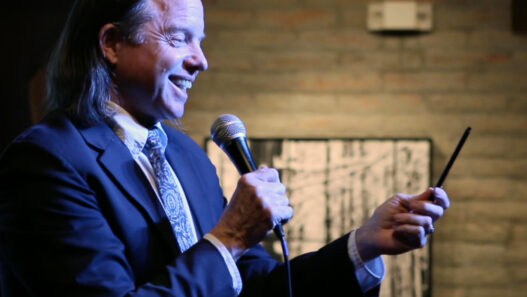Class 3: Which Karma Ripens First?
Hi, welcome back to our Wheel of Life online retreat. And we’ve reached our third session. By the way, I apologize that the meditation in the second section went on too long. Let’s try to set a timer this time.
So, there’s a tradition when you teach the steps to the path that you try to connect this whole retreat to the last retreat you did. So, for online session 3, we’re going to review where we left off in the last retreat. I think it was in Bali with many friends there.
[su_icon icon=”icon: link” color=”#ff1259″ size=”20″ shape_size=”12″ url=”https://www.youtube.com/watch?v=hXigB3fdczU&t=2s” target=”blank”]Jump to this place in the video[/su_icon]So, we’re studying the medium person’s motivation. They want to get out of all trouble life. They want to reach Nirvana. By the way, it doesn’t mean they want to disappear; just their life becomes perfect, and they don’t have a single problem in this life.
That’s like getting out of the jail, but there’s a famous joke in the steps to the path—lam rim (LAM RIM). If you don’t know you’re in the jail, you don’t want to get out of the jail. So, we have to talk about why we are in the jail, and we’ve reached the part in the lam rim where we talk about dying, which is kind of like going from one cell in the jail to the other cell in the jail. But, if you understand how each cell door works then you can break out of the jail.
[su_icon icon=”icon: link” color=”#ff1259″ size=”20″ shape_size=”12″ url=”https://www.youtube.com/watch?v=hXigB3fdczU&t=1m20s” target=”blank”]Jump to this place in the video[/su_icon]So, we’re going to talk about how do people die and what happens. And we’ve reached a very important part of the death process, which is called sundep-pa (GSOS ‘DEBS PA). And, in these lam rim teachings I’m going to sprinkle in some Tibetan and Sanskrit words. Stanley will turn them into traditional Chinese words, and I think it’s going to make your experience deeper, so please don’t be afraid of the foreign words.
Every word you learn will increase your knowledge and that will increase your ability to break out of the jail. So, here’s the Tibetan and I’ll pronounce it.
sundep yul ni, le kar nak mangpoy nang ne (GSOS ‘DEBS YUL NI, LAS DKAR NAG MANG PO’I NANG NAS). So, when you’re about to die there’s like a lottery that goes on in your mind. So, in your brain there are many, many, many seeds that you collected during your lifetime.
Some are good seeds, some are bad seeds, and actually there are millions of those. Now, just at the crucial moment of death—of the rough state of mind in death—your mind picks one of those karmas, out of millions, and when it picks it, it’s kind of like it turns on the timer for a bomb. So, you saw those hero movies, like Zhan Lang Er [Chinese movie: Wolf Warriors], or the famous American movies like Iron Man.
[su_icon icon=”icon: link” color=”#ff1259″ size=”20″ shape_size=”12″ url=”https://www.youtube.com/watch?v=hXigB3fdczU&t=2m59s” target=”blank”]Jump to this place in the video[/su_icon]The bad guy sets a nuclear bomb. He turns on a timer. Maybe it’s a 60-minute timer, and the good hero has 60 minutes to stop the bomb. So, that timer is actually a smaller bomb. And when the time runs out, the smaller bomb goes off and it triggers the bigger bomb. So, in Tibetan the word sundep-pa means to put on the timer, and that will cause the bomb to explode. And in this case, the bomb is your next life.
So, just as you are dying, they turn on the seeds in your mind … timer … and then that seed will blow up. And it will push you into a next life. Now, so it’s very important to choose the right seed. And there is a system about those seeds, and that was the last thing we studied in the lam rim in Bali, last December. We talked about who decides what seed is going to be selected in the lottery.
And in this lam rim book we had three decisions. First one: le kang top che-wa (LAS GANG STOBS CHE BA). It means: who decides which seed will open first? Then I’ll ask you a question. Well, which seed is more powerful? A powerful bad seed would be like you killed somebody. Or a powerful good seed you save someone’s life, one time in your whole life. And I have saved a person’s life. It’s the greatest feeling in the world and you never forget it. So, first principle. What was the most powerful seed?
[su_icon icon=”icon: link” color=”#ff1259″ size=”20″ shape_size=”12″ url=”https://www.youtube.com/watch?v=hXigB3fdczU&t=5m52s” target=”blank”]Jump to this place in the video[/su_icon]Okay, second principle. de nyam na, kang kom-pa che-wa dang (DE MNYAM NA, GANG GOMS PA CHE BA DANG) If the power of the two seeds is equal, well, which one will open first? And I don’t know, let’s say you told a big lie in your life, but you also criticized someone very badly in your life. And karmically, to tell a big lie and to give a big criticism to somebody, those two karmas are almost equal. So, which one will open first?
They can’t open at the same time; one has to open first. Then he says kom-pa che-wa (GOMS PA CHE BA), it means: which one are you more used to doing? Are you a person who who likes to lie all the time to people, or are you an angry person who criticizes other people? Then, if the time comes for those two seeds to open—lying and criticizing—then which one you did more often as a habit in your life, that seed will be selected at the moment of death. Okay, and then then the text says:
[su_icon icon=”icon: link” color=”#ff1259″ size=”20″ shape_size=”12″ url=”https://www.youtube.com/watch?v=hXigB3fdczU&t=9m08s” target=”blank”]Jump to this place in the video[/su_icon]de nyam na, kang ngun la che-pa (DE MNYAM NA, GANG SNGON LA BYAS PA). Good, his Tibetan is getting quite good.
So, suppose the habit is equal. And suppose the power of that karma’s equal. Well, then which one did you do first? Which one came before the other?
de nyi la sundep so (DE NYID LA GSOS ‘DEBS SO). That one will be selected. Now, there’s a very, very, very, very, very, very famous book about emptiness, which is called Gomba Rabsel (DGONGS PA RAB GSAL), which means “I will illuminate for you what Chandrakirti and Nagarjuna really meant about emptiness.” And that book is by Je Tsongkapa, and I think it’s maybe the greatest book he ever wrote.
And he asked the same question: which karma will be selected, which timer will be set? And he gives a little bit more detailed explanation. And that comes from an Abhidharma text. Abhidharma is some of the most ancient teachings of Buddhism in this world … very difficult. Stanley is actually translating the most famous book; he’s scheduled to finish in 2046.
[su_icon icon=”icon: link” color=”#ff1259″ size=”20″ shape_size=”12″ url=”https://www.youtube.com/watch?v=hXigB3fdczU&t=11m10s” target=”blank”]Jump to this place in the video[/su_icon]And in that book, there’s a poem and it’s supposed to be by the Buddha. And I wanted to give that to you. I will do that during these lam rim teachings if I think some idea’s very important; like “which seeds can I open first when I die?” To me, that’s a very important question. So, sometimes I will go deeper on a question from another book, and that’s why these retreats take so long. It’s to help you in your life. So, I’d like to take this poem from Vasabandhu and from Buddha.
le kyi korwar chi kang dang,
nye-wa kang dang kom-pa kang,
ngun che kang yin de dak le,
nga ma nga ma rnam min gyur,
(,LAS KYIS ‘KHOR BAR LCI GANG DANG,
,NYE BA GANG DANG GOMS PA GANG,
,SNGON BYAS GANG YIN DE DAG LAS,
,SNGA MA SNGA MA RNAMS SMIN ‘GYUR,)
le kyi korwar chi kang dang … kang dang (GANG DANG) means: when the karma makes you spin in the wheel, there’s a certain priority system. Some seeds have to open before other seeds. And that depends on certain factors.
chi kang (LCI GANG) means “which karma is more serious”? Killing someone is more serious than lying to someone.
Then it says nye-wa kang (NYE BA GANG). Which one is closer? And this is a very, very important idea, which we’ll talk more about in future segments of this lam rim. But “closer” means, “closer to the moment of death,” So, certain kinds of karma, even though maybe they are not as serious as other karmas, but if you do them closer to the moment of your death and passing on, then they will take priority.
Like, if you have a great desire on the last day of your life it can change which karmic timer is put on, and we’ll talk about it. Then it says kom-pa kang (GOMS PA GANG), which one did you do more frequently? Which one did you get used to because you used to do it a lot?
And, one thing I don’t like about these online classes … I like to quiz my students and offer reward money, so I don’t get to do it in the online class. So, this class is going to be cheaper for me, but it’s fun for me to do that kind of gambling. Maybe, I’ll ask Stanley.
[su_icon icon=”icon: link” color=”#ff1259″ size=”20″ shape_size=”12″ url=”https://www.youtube.com/watch?v=hXigB3fdczU&t=14m52s” target=”blank”]Jump to this place in the video[/su_icon]So, here it says kom-pa (GOMS PA), and it’s pronounced kom-pa, kom-pa. Yeah, and it means “you got used to something.” “You got a habit.” Then there’s another Tibetan word for $100 … so all of you are not going to get money, only Stanley and Allison will get money during this lam rim. I think if they don’t get it correct, they should give me the money.
Okay, so if you change the pronunciation… kom-pa means “to get used to something.” For $100, Stanley … maybe we could have him represent someone in the audience … what’s the verb gom-pa (SGOMS PA) mean? gom-pa—sounds almost the same. Yeah, “meditation.” Hundred dollars! So, I’ll give you a hundred dollars. Stop answering all of them.
Okay, so it’s very interesting that the ancient word for meditation comes from the word which means “to do something over and over until you get used to it.” And the idea, for example, in the seven-part meditation preparation which we did in the last segment—if you appreciate and express your gratitude to your teacher over and over in the meditation, then that will become a habit. And your mind will change, and you will become a person who is more grateful to other people.
[su_icon icon=”icon: link” color=”#ff1259″ size=”20″ shape_size=”12″ url=”https://www.youtube.com/watch?v=hXigB3fdczU&t=18m05s” target=”blank”]Jump to this place in the video[/su_icon]Okay, now the other factor that Vasabandhu mentions in the ancient Abhidharma teaching: ngun che kang yin (SNGON BYAS GANG YIN). Also, a factor is: which seed did you plant before the other one? I spent years working through this explanation of three factors that cause the seed to open first, and four factors that cause the seed open first, because we want to be sure to make a good seed open first when we die. So, if you really studied these quotations, in my opinion, you have to read it this way.
Okay, here we go. Four factors which decide which karma’s going to open first when you die.
[su_icon icon=”icon: link” color=”#ff1259″ size=”20″ shape_size=”12″ url=”https://www.youtube.com/watch?v=hXigB3fdczU&t=20m21s” target=”blank”]Jump to this place in the video[/su_icon]Okay, then first rule, generally speaking, the seed that you planted first will open first. First in/first out in accounting system. And that kind of makes sense. So I always remember this big lie I did when I was a kid. Only once in my whole life I stole money- from my mother. I stole five dollars when I was young.
And so, let’s say later when I was in the diamond business, suppose I wasn’t honest on my taxes—although I was. So, let’s say theoretically I cheated on tax. So, it makes sense, at the time of my death, if those two seeds haven’t opened yet, which one will open first? Yeah, the first one I did when I was a kid. So, that makes sense. First in/first out.
[su_icon icon=”icon: link” color=”#ff1259″ size=”20″ shape_size=”12″ url=”https://www.youtube.com/watch?v=hXigB3fdczU&t=21m45s” target=”blank”]Jump to this place in the video[/su_icon]Now, second factor. And I’m interpreting these two quotations. Let’s say in my diamond career for 19 years, I cheated on my taxes every year, 19 times—and it kind of covered my whole 19-year career—which it *did not* by the way. So, you have one lie to my mom when I was a kid, then you have a cheating on my taxes over and over, which takes about six months preparation, for 19 years. And if those seeds—karmas—didn’t open yet when I die, which one will be triggered first? Yeah, 19 years of cheating, even though it came after the lie when I was a kid.
[su_icon icon=”icon: link” color=”#ff1259″ size=”20″ shape_size=”12″ url=”https://www.youtube.com/watch?v=hXigB3fdczU&t=23m35s” target=”blank”]Jump to this place in the video[/su_icon]Now, third factor. What if I’m in the hospital and I’m dying … and don’t forget in Buddhism, dying is not really an end. My rough consciousness dies, and then I go to a very very primordial ancient consciousness—subtle consciousness. So, in the moment of that transition of my mind—from being aware of this world to the ancient, ancient stream of mind which I have had for billions of years.
So, in that delicate moment of the last ability of my mind to have a normal thought, what if in that moment my family is crying, and they grab my arm, “Don’t go, don’t go!” Then my mind is almost dying to a subtle level. I can’t even recognize who’s grabbing my arm. Is it my kid or my wife, but I feel this grabbing of my arm and then suddenly I remember a fight I had when I was a teenager when someone grabbed my arm and I hit them. So, in that subtle minute—when my mind is going from this life mind back to my subtle mind—in that moment someone grabs my arm and I feel this hatred that I felt when I was a teenager. Then that one’s [karmic seed] going to cancel the two other ones.
Forget the lie when you’re a kid. Forget the cheating on your tax, even though it went on for 19 years. In that crucial moment, if you feel intense anger, guess which seed will open? Yeah, the one where you hit the guy. And we’ll talk more about that. But obviously it’s very important that people die in a very conducive peaceful atmosphere.
And if we are their relatives, we have to be careful … we have to make sure they die in a peaceful way. Okay? The room should be peaceful. The people are standing around are sad, but they are not making loud frightening noises.
[su_icon icon=”icon: link” color=”#ff1259″ size=”20″ shape_size=”12″ url=”https://www.youtube.com/watch?v=hXigB3fdczU&t=25m17s” target=”blank”]Jump to this place in the video[/su_icon]Okay now, the fourth one. So far we had some lie I did when I was a small kid, and normally that one should open first; at death, for example. But, if I did a similar lying but over and over for 19 years, then that karma will come to the front of the line ahead of the kid karma. And that will decide where I go in my next life. But in the moment that was supposed to open, someone grabbed my arm and I got a big anger.
Then now that super hot anger at the last moment will take priority. Unless there was a very heavy karma in my mind. You know, like I went to a war and I was struggling with another soldier and I consciously pointed the gun at their head and I shot. That one is so much more serious than lying to my mother, than nineteen years of cheating on my taxes, than someone grabbing my arm at the last moment. Then that killing karma is obviously going to first … to the front of the line.
So, this is the one that makes sense to me—how to read those verses. Let’s review and we’ll stop this segment.
[su_icon icon=”icon: link” color=”#ff1259″ size=”20″ shape_size=”12″ url=”https://www.youtube.com/watch?v=hXigB3fdczU&t=29m35s” target=”blank”]Jump to this place in the video[/su_icon]This time we’re going to practice dying … but not exactly okay? Generally speaking, if I did it earlier—I lied to my mom when I was a kid—then generally, that one should open first.
Unless, later in my life I did some kind of lie for 19 years, now that one should open at the moment of death and decide where I go.
Unless, someone grabs my arm while I’m dying and suddenly I remember some violent day. Then that one will move to the front of the line.
Unless, in my whole life I did some very, very serious bad deed, like killing another human being.
So, that’s our review of where we stopped in the last retreat, and we’re ready to move on to segment number four.
Thank you, and thank you Stanley for translating.
[su_icon icon=”icon: link” color=”#ff1259″ size=”20″ shape_size=”12″ url=”https://www.youtube.com/watch?v=hXigB3fdczU&t=32m07s” target=”blank”]Jump to this place in the video[/su_icon]









